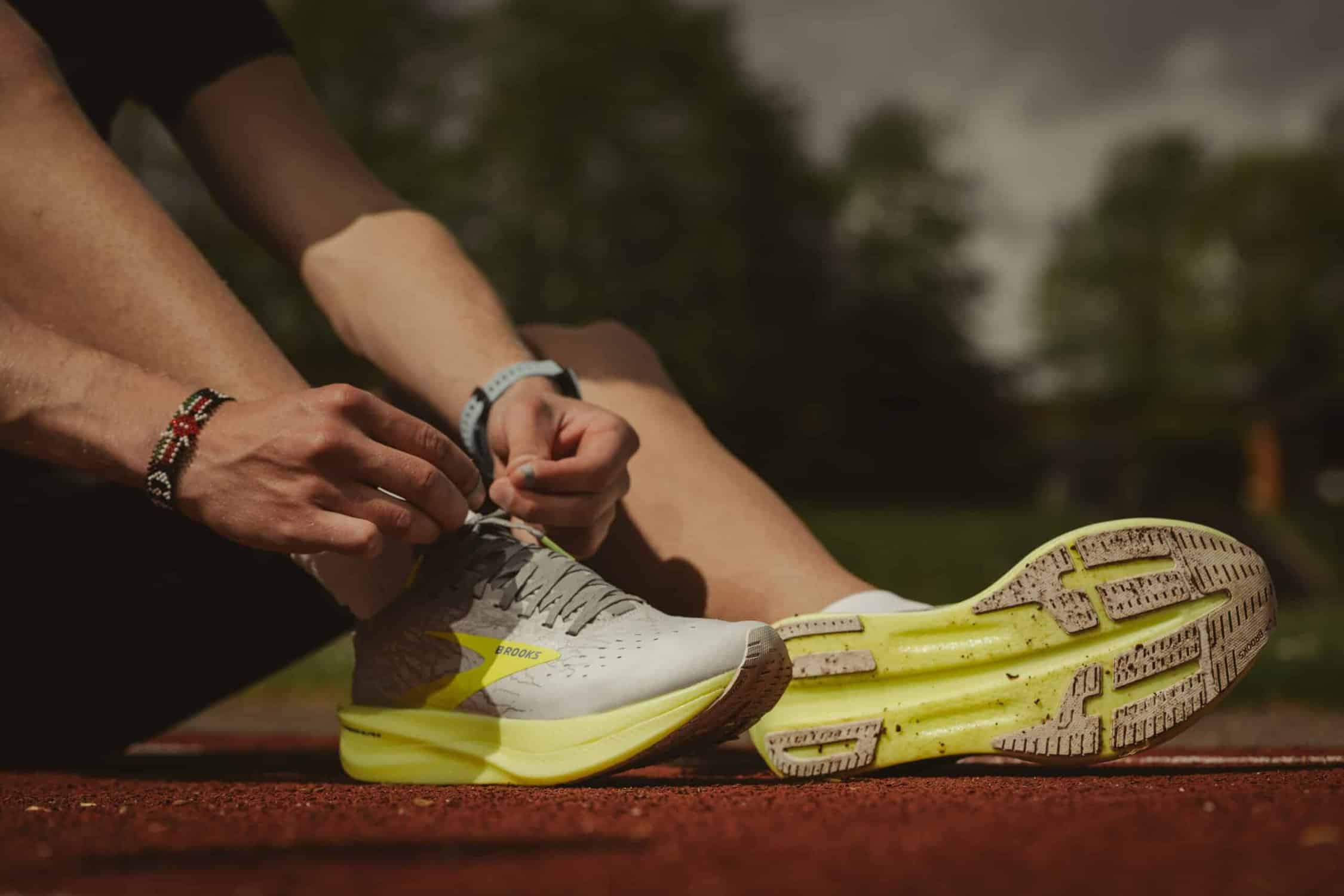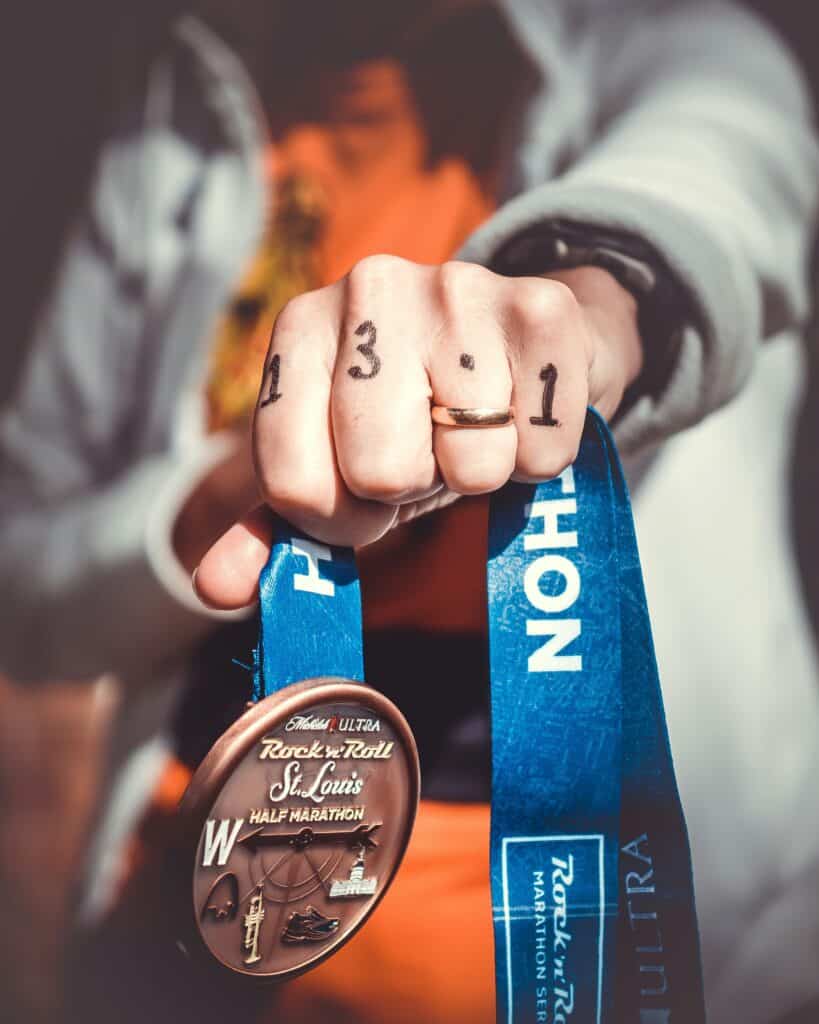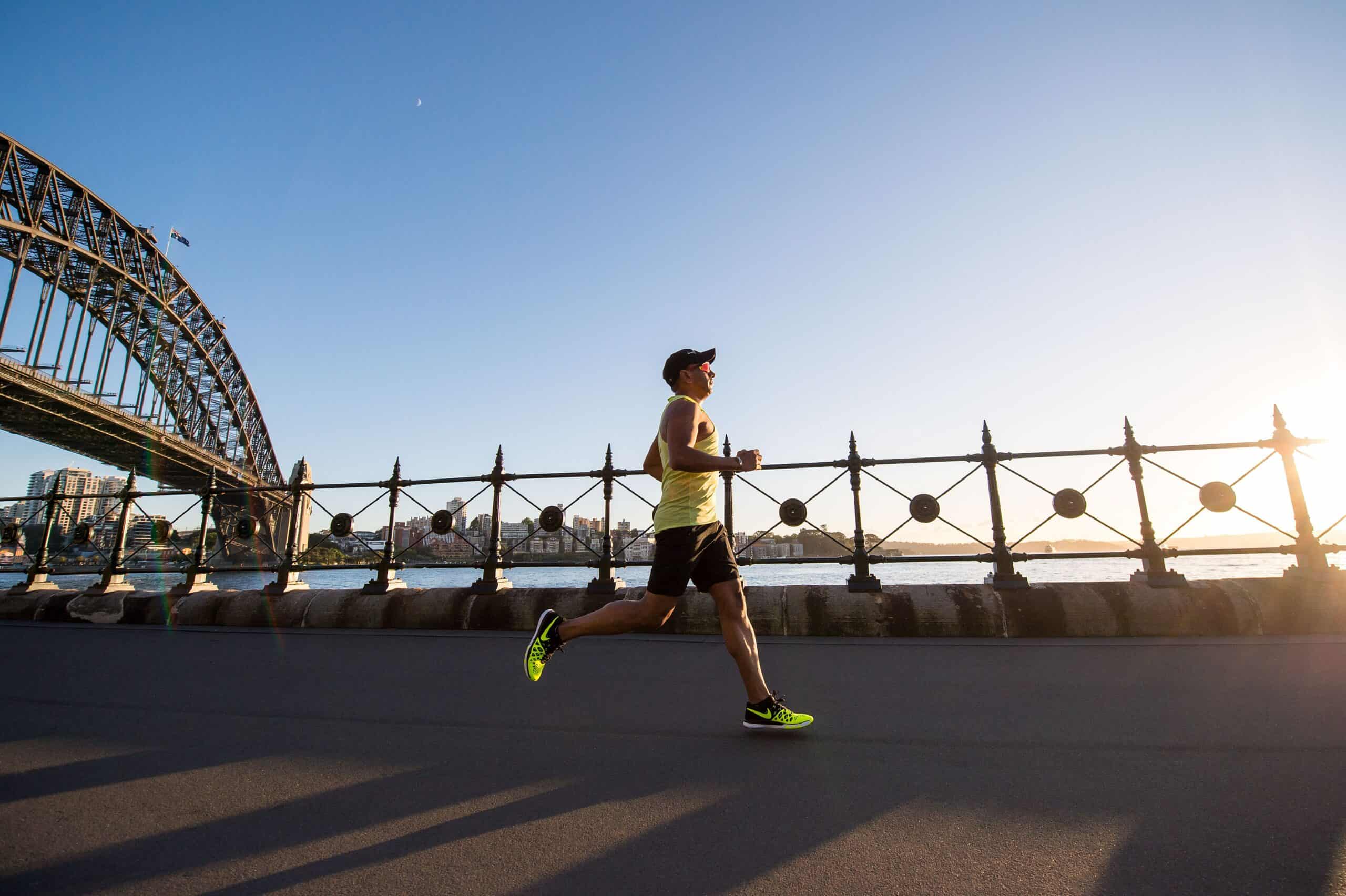
If you’ve ever run a half marathon, you know you can’t just cross the finish line and call it a day. There are steps you need to take to ensure your body recovers well from all that running. Otherwise, you run the risk of being too depleted, sick, or injured for your next race! In this guide, we’ll explore what happens to your body during a half marathon and what happens after you finish running. We’ll also cover how you should be eating, treating your body, and exercising in as you get into your half marathon recovery.
Let’s get started!
What Happens to Your Body During a Half Marathon?
It’s important to remember when you’re recovering from a half marathon you’re also recovering from the training you did leading up to it.
All that cumulative running can lead to interesting things happening inside your body on race day.
For example, your immune system may temporarily decrease.
That’s right. Even though exercise generally boosts your white blood cell count leading to better immunity, endurance runners can experience the opposite effect. (If you’ve run a few half marathons, it’s not uncommon to come down with a cold after your race!)
Another surprising effect of marathon running? Inflammation in your body can increase.
Even though exercise generally has an overall anti-inflammatory effect, it’s totally normal for your body to have a temporary inflammatory response to the stress of intense exercise. In fact, it’s part of what makes your body stronger.
However, rest and recovery are essential for ensuring a temporary inflammatory response doesn’t turn into a chronic one.
There are also other things happening to your body while running. You’re likely more aware of, like blisters, muscle fatigue, and even black toenails!
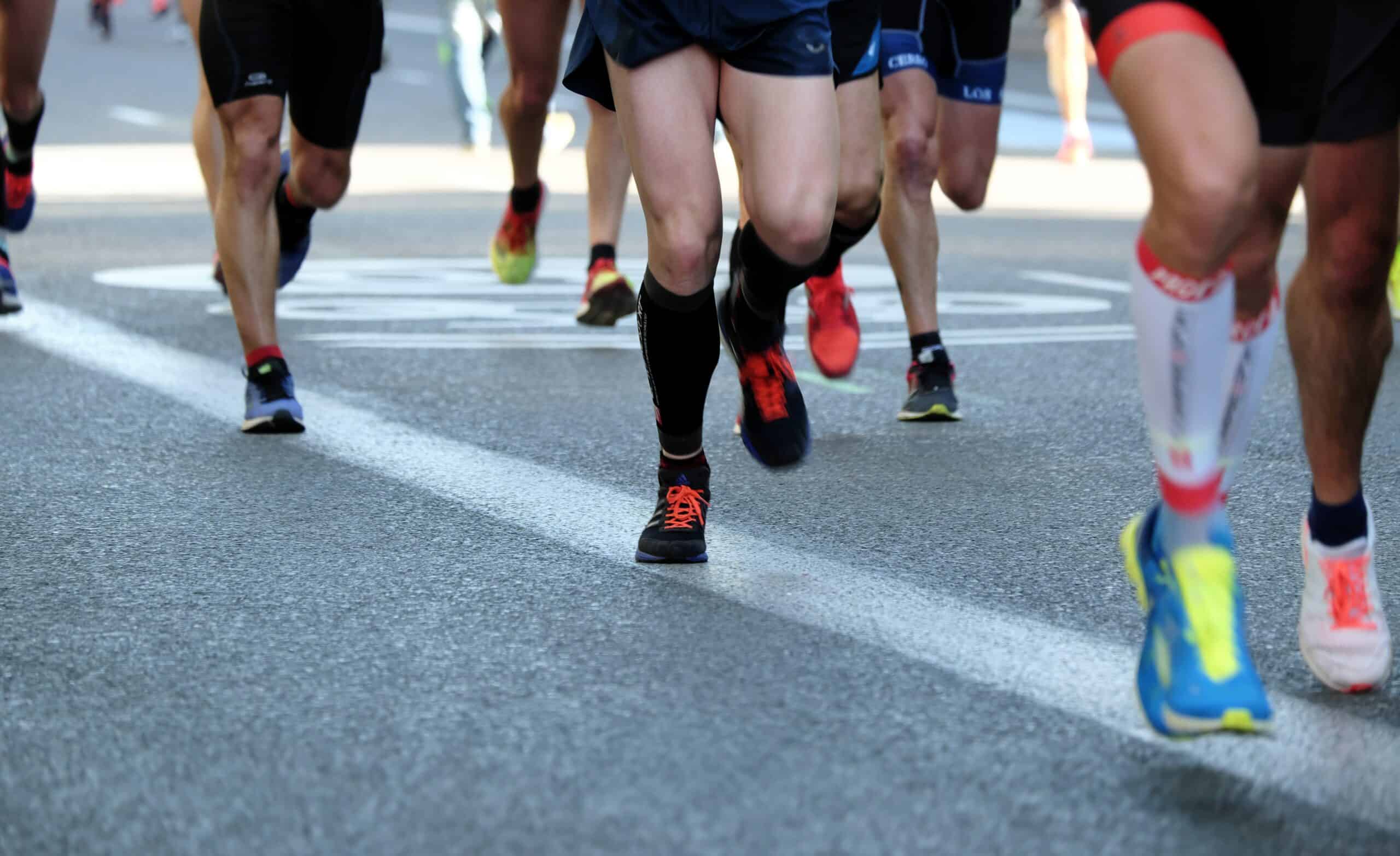
Half Marathon Training
While some of these symptoms are par for the course when you’re a long distance runner, most issues can be prevented with adequate preparation.
And in this case, preparation means not overtraining! If you’re experiencing injuries, burnout, or intense fatigue prior to your race, that likely means you’re doing too much.
Some other, more subtle signs of overtraining include changes in your mood—like feeling irritable or sad—or getting sick often.
If you’re experiencing any of these telltale signs, it’s time to remind yourself recovery is an essential part of your training plan. You need to rest frequently, stretch and foam roll regularly. For our favorite running recovery gear, read our recovery product guide. Our favorite foam roller, the TriggerPoint GRID Foam Roller.
Don’t forget to engage in active recovery activities like strength training and yoga to build and strengthen your muscles.
Eating for Your Half Marathon
Another essential part of half marathon recovery? Refuel! Eating well! This is not the time to skimp on calories or eat an excess of processed convenience foods.
Make sure you’re eating a balance of protein, carbohydrates and fat with every meal, and get in the habit of eating a real breakfast. (A latte doesn’t count!)
If you’re not sure how many calories you should be consuming or how you should balance your macros, don’t leave it up to chance. Consult a simple calorie calculator. Get a baseline of calorie intake for your activity level and work. Also consult a qualified dietitian or nutritionist to develop a plan in preparation for your half marathon.
What Happens Immediately After You Finish a Half Marathon?
Completing a half marathon is a big deal for your body. You’ll be feeling the effects of it for a while after you kick off your running shoes.
24 to 48 Hours After Your Half Marathon
While you can take measures to reduce it, you’re inevitably going to feel some soreness in the day or two after you run your half marathon.
This is largely due to inflammation. Inflammation is high in the 24 hours after your run and can stay elevated for a week or more regardless of your fitness level.
Cortisol also peaks while testosterone plummets in the days after your run. Both chemicals make you prone to injury. So, it’s important to be mindful of your movement in the days after your half marathon. (More on that soon.)
Some other sensations you may experience in the couple of days after your half marathon are fatigue, elevated hunger, and even some sadness.
This is a totally normal feeling after something you’ve been working toward has ended. But, if your low mood lasts for more than a few days, it’s a good idea to check in with your doctor.
72 Hours and Beyond
After you’ve run a half marathon, you may feel invincible. Even if you’ve mentally recovered from your race after a couple days, your body will take a little longer to catch up.
Many runners start jonesing to hit the pavement a few days after they complete their marathon. Your body is still working hard to reduce inflammation. Heal your muscles and balance your hormones, so it’s best to keep exercise low-key.
Once you’re about a week out from your marathon, it’s okay to start upping your exercise in earnest and—if you’d like to—start thinking about your next race.
Let’s dig into exactly how you can balance movement, exercise and nutrition in that pivotal post-race week.
Half Marathon Recovery
Let us be the first to tell you: even the most experienced runners need time to recover after running a half marathon. Even if you feel great after your race, it’s not a good idea to jump right into training for the next one.
Recovering is an essential part of running a half marathon. And with the right mindset, it can be a very enjoyable part!
So what is the best way to recover after a half marathon? Let’s begin by exploring how to eat.
Half Marathon Recovery Nutrition
Something you need to do at every stage of your recovery journey: hydrate! Hydration is critical for everything from regulating your body temperature immediately after running to easing inflammation in the weeks after your race.
But contrary to popular belief, gallons of plain water aren’t your only way to hydrate. You’ll also want to focus on electrolytes. Electrolytes keep your digestive, nervous and other systems running smoothly and draw hydration into your muscles.
While there are plenty of electrolyte sports drinks and powders out there, many are filled with artificial dyes and excess sugar, so be sure to read ingredient labels. Brands like LMNT and nuun are popular among beginners and experienced runners like. Or, opt for natural sources of electrolytes, which are abundant in foods you may not expect like:
- Apricots
- Tomatoes
- Spinach
- Almonds
- Yogurt
- Plain or chocolate milk
Now let’s dive into post-race nutrition by time period:
What to Eat Immediately After Running a Half Marathon
Good news, immediately after your run, you get to load up on carbs to help re-up your body’s glycogen stores. In this case, simple carbs like fresh fruit and honey are your best bet. Just remember to enjoy them in moderation.
After your body has had a couple of hours to recover from the race, it’s time for a hit of protein. Think nut butters and lean meats. While protein bars are okay, a whole-food, unprocessed meal is better.
Healthy fats are typically an essential part of a balanced meal, but you want to keep them to a minimum in the few hours after your race. Fats slow down your digestion of carbs, which is typically a good thing. But in this special instance, your body needs that sugar hit relatively quickly.
Remember to hydrate as soon as you finish running and to continue throughout the day. This is essential for all the repair work your body needs to do after a big run and can also help prevent injury.
What to Eat the Week After Your Half Marathon
Even if you’re feeling back to normal 24 hours after your big race, your body is still in recovery mode and it’s a good idea to treat it as such. That means focusing on eating regular, balanced meals that aid in the recovery process.
Your number one goal (besides staying hydrated!) is to load up on foods that fight inflammation. Pile your plate with an array of fruit, vegetables and fatty fish to get the most benefit. The more color on your plate, the better.
As much as you may want to indulge after all of your hard work, it’s still a good idea to keep processed and sugary foods to a minimum. Have that slice of celebratory cake, but then focus on nourishing your body with foods that will help you rebuild and restore.
When you prioritize meals balanced with lean protein, healthy fat and complex carbohydrates, you’re likely to be struck by fewer sugary cravings.
And we hate to be the bearer of more bad news, but this isn’t the time for a ton of celebratory alcoholic drinks, either. One glass of champagne or your favorite beer is okay, but consuming more increases the risk of dehydration at a time when your body is already desperately in need of rehydration.
Finally, you may want to supplement with herbs and vitamins that fight inflammation and aid in the recovery process. Talk with your doctor about the best supplements for you.
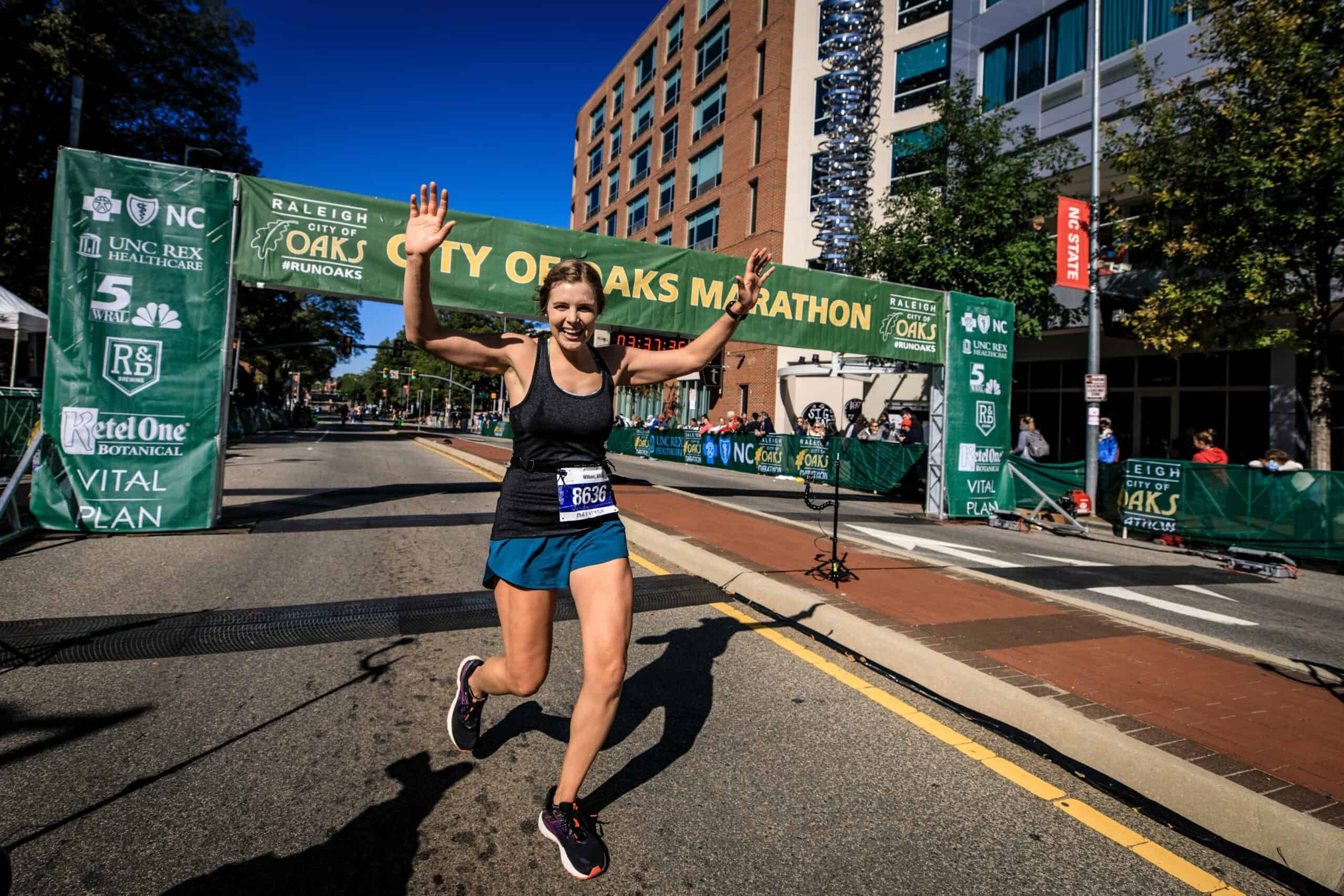
How to Care for Your Body After a Half Marathon
The way you treat your body in the hours and days after your race can influence how well you recover. Here are a few things to make sure you do:
After Finishing Your Race
Once you’ve completed your half marathon, you may want to collapse into a chair. But it’s important to keep walking for at least 10 minutes to give your heart and other muscles a chance to recalibrate and recover.
Beyond that essential first step, there is no “perfect” way to recover on race day, and it’s important to listen to your body. But if you’re looking for a some tips, here are some of our favorite recovery tips:
If you want to foam roll, do it soon after you run to boost your circulation and help reduce muscle soreness by reducing the amount of lactic acid that gets stored in your muscles.
When you hop in the shower after your run, it should be a cold one. Cold water will help reduce the swelling and inflammation brought on by miles of running. If you’re feeling really bold, this is also an excellent time for an ice bath.
For less adventurous bathers, consider an epsom salt bath. Epsom salts break down into magnesium and sulfate which, during a bath, are absorbed into your body through the skin.
Similarly, this is a great time to ice any sore spots on your body.
After you’ve showered, eaten and celebrated with loved ones, you’ll likely be exhausted.
That’s to be expected and you don’t have to fight it. In fact, it’s an ideal time to take a nap. An hour of snoozing can help your body get a jump-start on muscle recovery and reduce pain.
Don’t forget to change into dry, clean clothing first. You may have heard advice to slip on a pair of compression socks after your run. While this isn’t mandatory, there are some studies that show a small improvement in performance from runners who don the socks.
And last but not least: no more exercise on race day! You’ve done enough.
The Day After Your Half Marathon
If you’ve really been bit by the running bug, you may be eager to get back to running the next day.
While running isn’t entirely prohibited, we can’t emphasize this enough: listen to your body! If you’re feeling worn-down, emotionally drained, or are nursing an injury, sit this day out and let your body recover.
If you’re feeling okay, you can go for a short, light jog or do another form of low impact exercise (think pilates or swimming) the day after your race. This gentle boost in circulation can help your body recover more quickly.
And we know we sound like broken records here, but don’t forget to keep hydrating!
The Week After Your Half Marathon
Chances are once you hit day three or four after your race, you’re going to feel fairly recovered and ready to get going at full speed again. Take it from us: that’s a bad idea. Even if you feel okay (or great!), your body is still hard at work recovering for at least seven days.
If you try to bypass this time period, you risk delaying your progress or sustaining an injury.
As the week progresses, you can continue to go on light, short (about 20 minutes) runs if you’re feeling up to it, and you can continue with low-impact exercise. Be sure to prioritize a full eight hours of sleep during this time period too.
Alternate ice and heat on any sore spots or pulled muscles that are giving you trouble.
Once you’ve reached a week of recovery, you can begin making a plan and training for your next half marathon if your body feels ready.
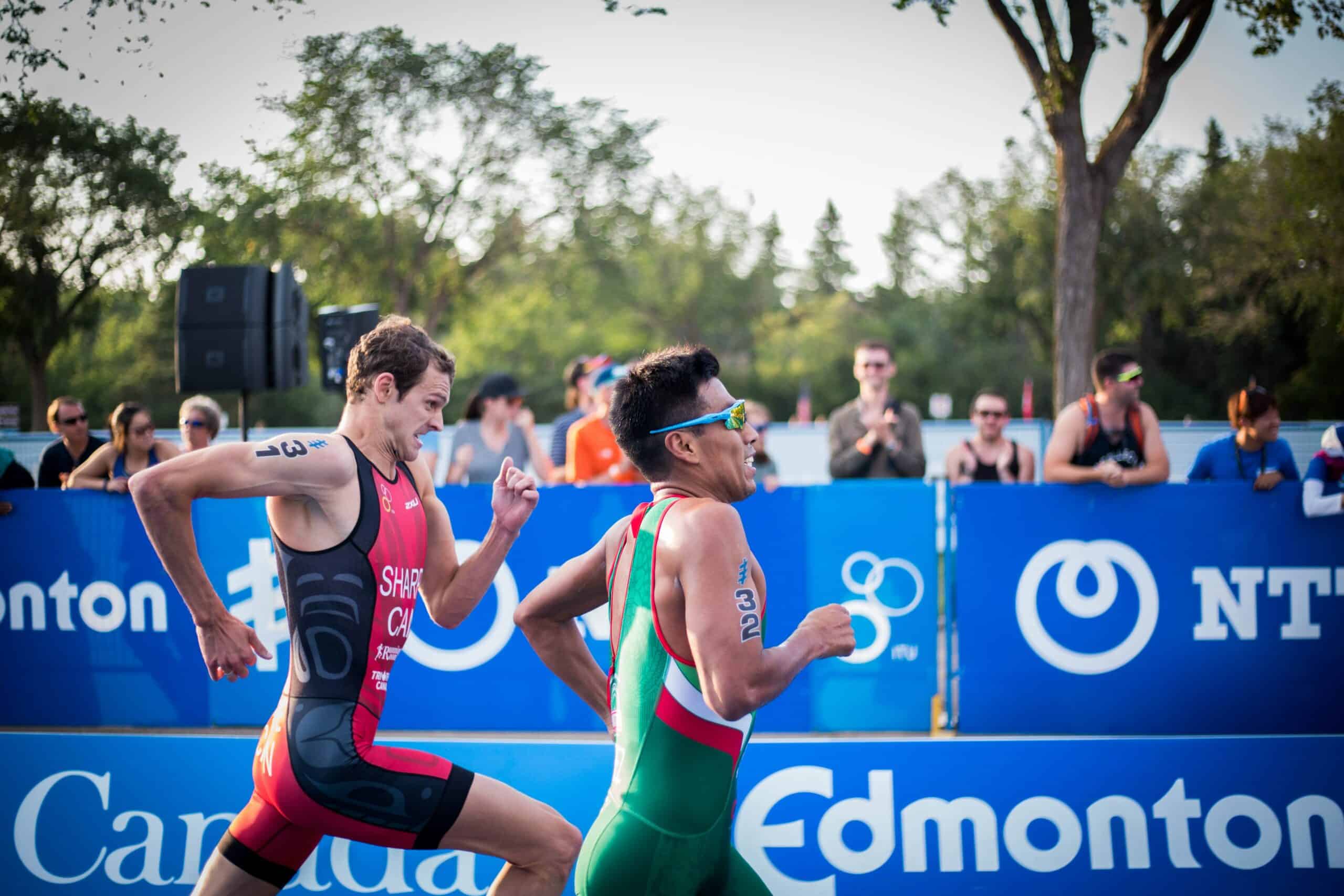
The Ideal Recovery Plan
The perfect half marathon recovery plan will depend on your unique body and needs, so be sure to tune in to any signals your body is sending you.
Just remember complete, balanced meals, regular hydration and eight hours of sleep are important. So too is taking it easy in the first week after your race.
If you treat your body with TLC after this half marathon, you’ll be in great shape to kill it at the next half or full marathon. Good luck out there!
Half Marathon Recovery FAQ
Post-race recovery depends on your unique body, but we suggest taking at least a 24-48 hour recovery period to lay low. After that, you can begin recovering with small, easy runs or do some cross training with bodyweight workouts or cycling.
Muscle soreness is typical after a half marathon and can make walking difficult. It’s still important to walk at least ten minutes after completing your race to give your muscles a chance to recover.
After that, it’s more than okay to take a load off while your muscles heal. Chances are you’ll be walking fine again in no time!
In the 48 hours after your half marathon, your body is working to return to a pre-race state. Inflammation is high and hormones like cortisol and testosterone can be knocked out of balance.
With time, your body will return to equilibrium on its own—so long as you give it proper rest and nutrition.
This answer depends on many factors, such as your age, experience, and how you prepared for your run.
Generally speaking, you’ll feel sore muscles for three or four days, and then the pain will begin to dissipate. That said, it’s common not to feel sore until a day or two after your run. (This is called delayed onset muscle soreness, or DOMS.) With proper nutrition and rest, your recovery time will be manageable.
If you feel well enough, you can also incorporate recovery runs into your post half marathon recovery. Don’t exceed three miles in your first run back after your half marathon.
If you’re feeling sore for much longer than a week, it’s a good idea to chat with your doctor.

